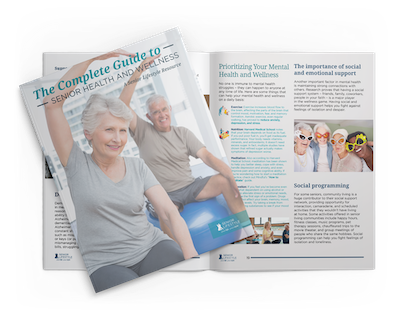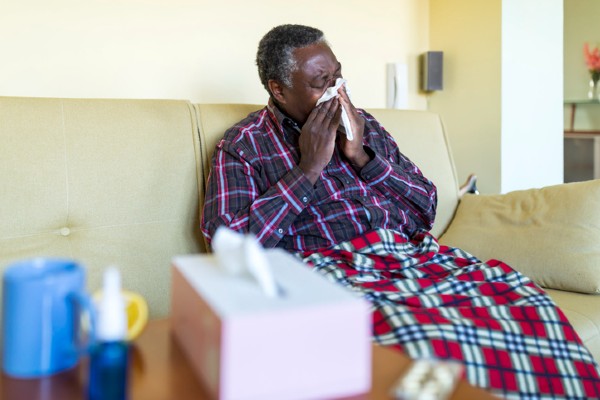With so much attention being paid lately to the dangers of COVID-19, and rightfully so, many people have forgotten how hard cold and flu season can hit, too.
People ages 65 and older have a higher risk of serious complications from the flu because their immune system defenses weaken somewhat with age. These older adults account for more than one half of all flu-related hospitalizations (50%-70%) and the most flu-related deaths (85%), according to Medscape.
Learn more about avoiding the flu and colds, how to know if you’re really sick this cold and flu season, and what to do if you get sick.
12 Ways to Stay Healthy This Cold and Flu Season
Here are some practical cold and flu season prevention tips that can help keep you feeling healthy this year.
1. Avoid Crowds and Unnecessary Travel
This season is a time of travel, with Thanksgiving, Christmas and other celebrations as the year comes to a close ‒ and begins anew. But crowds, especially those in airplanes, can increase your chance of catching a cold or flu from an infected person. Try to avoid large groups of people, especially in poorly-ventilated spaces. If you are in a limited space, try to keep your distance, at least six feet.
2. Don’t Touch Your Face
This advice has been renewed with the COVID pandemic, but illness can enter the body quickly through your eyes, nose and mouth. Touching your face, even inadvertently, can speed up the dangerous process. To reduce the risk of getting sick, minimize touching your face.
3. Drink Plenty of Liquids
Staying hydrated, especially hot tea or just plain water, can help the body battle germs better. Take note, though, that heavily caffeinated drinks can actually cause you to lose hydration.
An often-cited source, the National Academies of Sciences, Engineering and Medicine, has reported that adequate hydration appears to be 2.7 liters (91 ounces) for women and 3.7 liters (125 ounces) for men daily. Only 80% of this intake should be from water and other beverages, while 20% should be derived from food.

Download The Complete Guide to Health & Wellness for Seniors
As people grow older, their health and wellness needs change. Read our eBook, “The Complete Guide to Health & Wellness for Seniors” for everything you need to know about staying healthy and happy as we age.
Download the Guide4. Exercise Regularly
Moderate exercise boosts the immune system and could reduce risk of a cold, according to the Cleveland Clinic. A regimen of 20-30 minutes of exercise five days a week can help. For the long term, working out regularly also reduces the risk of many chronic diseases such as cardiovascular diseases, metabolic diseases and respiratory illnesses.
5. Get a Flu Shot
Older adults are especially vulnerable to dangerous complications of the flu. Older adults are also most likely to be hospitalized for complications of the flu. It’s a good idea to check with your doctor to make sure you don’t have any health issues that could be aggravated by the vaccination.
6. Get a Pneumonia Vaccine, Too
Flu can develop into pneumonia, which can be deadly for seniors. This shot helps prevent certain strains of bacterial pneumonia. Ask your doctor about the pneumococcal vaccine.
7. Mask Up
Wearing a mask can prevent you from catching someone else’s cold or flu, and can help prevent you from spreading illness. Masks should fit snugly over the nose and under the chin.
As with the pandemic, the U.S. Centers for Disease Control and Prevention recommends two-layer masks, or doubled gaiters, not balaclavas, kerchiefs, scarves, ski masks, face shields alone, or masks with exhalation vents or valves. The CDC says that surgical N95 masks should be reserved for health care providers.
8. Keep Your Surroundings Clean
Multiple hands can spread germs through door knobs, light switches and other household things. Be sure to wipe clean anything that gets a lot of touches.
Also sanitize your mobile devices. Clean them regularly with sanitizing wipes or rubbing alcohol, but be careful not to wet the electronics.
9. Stay Away from People Who Are Sick
Watch your own health by keeping your distance from people who are sick. If you find yourself around a sick person, limit your contact and avoid unnecessary touching like shaking hands or hugging. Also avoid touching anything they’ve touched.
10. Stay Away If You’re Sick, Too
If you have the flu, you need to stay home to protect other people. People are trying to keep themselves well, too, and won’t want to interact with anyone who isn’t feeling well.
11. Take In More Vitamin C
Although it won’t prevent you from getting sick, studies indicate that extra vitamin C may limit the severity or shorten the duration of illness, according to the National Institutes of Health. Vitamin C is best to receive through food such as citrus fruits, but supplements of 200 milligrams can be helpful, too.
12. Wash Your Hands
Soap and water can help remove viruses from your hands. One rule of thumb is to scrub vigorously for 20 seconds, roughly the time it takes to sing “Happy Birthday” twice. The water doesn’t need to be hot, because the scrubbing itself will do the job. Also keep alcohol-based hand sanitizer nearby to use if you can’t get to soap and water.
How to Know If You’re Sick With Cold or Flu
If you’ve been exposed to cold or flu, keep on the lookout for symptoms. If you’re sick, you need to get medical care right away. Here are some signs that you should get medical care, according to the CDC:
- Body aches, headache, chills and fatigue
- Difficulty breathing or shortness of breath
- Fever or cough that improve but then return or worsen
- Not urinating
- Persistent dizziness, confusion or inability to waken
- Persistent pain or pressure in the chest or abdomen
- Seizures
- Severe muscle pain
- Severe weakness or unsteadiness
- Vomiting and diarrhea
- Worsening of chronic medical conditions
There may be other symptoms if you’re sick. Consult your physician for any other symptom that is severe or concerning.
What You Should Do If You Get Sick
The flu typically lasts three to seven days in healthy people, but it can last longer in seniors because of their weaker immune systems.
Don’t hesitate to call the doctor if you get sick, even if you’re not 100% sure it’s the flu – they can help with the diagnosis. Here are steps to take after you think you’re sick, according to DailyLiving.
- Drink extra fluids – The extra liquid can help thin out mucus, which makes it easier to get it out of your system.
- Eat chicken soup – This is a home remedy that is actually beneficial. The steam from hot soup opens nasal passages, the broth soothes the throat, and the soup actually helps infection-fighting white blood cells do a better job.
- Get a prescription for an antiviral medication – Visiting your doctor for antiviral drugs as soon as possible can make the flu milder and prevent serious complications that senior adults face, such as pneumonia.
- Rest or sleep at a 45-degree angle – Lying down flat causes mucus to gather in sinus cavities, which may lead to further infection. Resting or sleeping at an angle helps prevent this and reduces inflammation.
- Use a humidifier – Moist air helps soothe sore throats and hacking coughs.
Stay Healthy at a Senior Lifestyle Community
At Senior Lifestyle communities, we take the health of seniors seriously. We look after our residents’ physical and mental health with special programs.
Reach out today to learn more about living at a Senior Lifestyle community.

